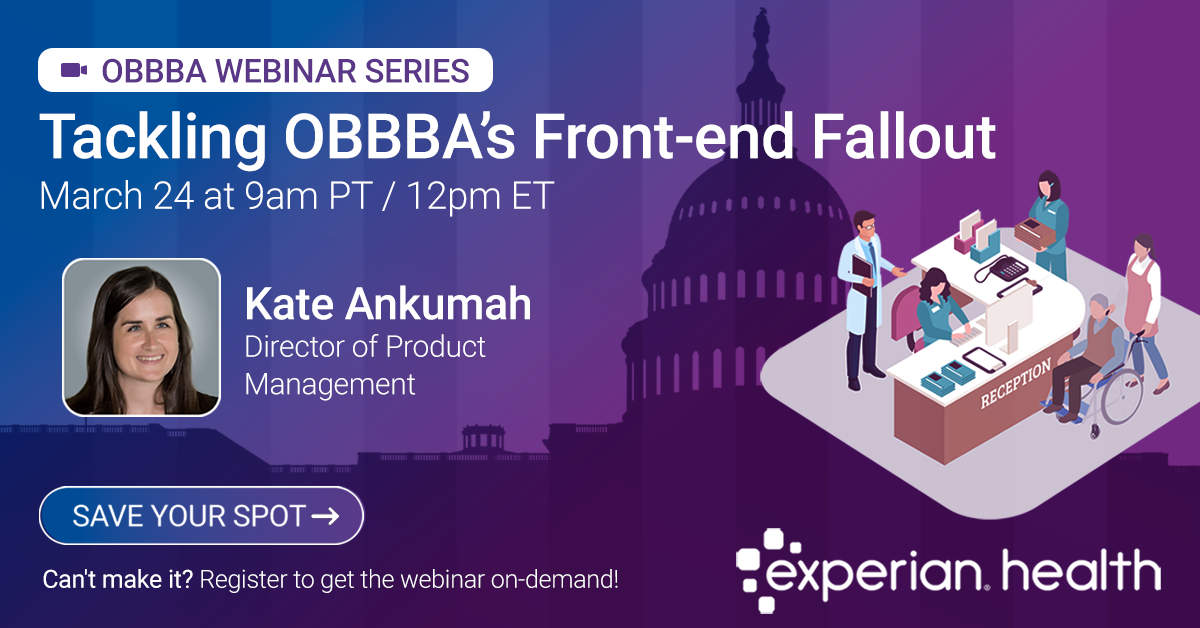
Key takeaways:
- Many eligible patients don’t apply for charity care simply because they don’t know it’s available, leading to financial strain for patients and providers.
- Improving charity care communication helps patients understand their options early, builds trust and reduces uncompensated care for providers.
- Automating financial assistance screening with tools like Patient Financial Clearance supports compassionate financial conversations and ensures more patients are connected to support at scale.
Patients face difficult choices when the cost of care feels out of reach. Some hesitate to proceed with planned services due to affordability concerns, even though financial assistance may be available. For providers, Medicaid rollbacks under the budget reconciliation bill could leave more patients without coverage, increasing the volume of uncompensated care and making revenue less predictable. Charity care programs provide a financial safety net – but only if patients know about them. This article looks at how improving charity care communication connects more patients to the financial support they need.
Why clear communication about charity care matters
Charity care programs are designed to remove financial barriers to care for those most in need. They provide full or partial discounts to uninsured or underinsured patients for medically necessary services, as set out in hospital policies and state-level regulations. However, according to a 2025 Lown Institute study, millions of eligible patients do not apply because they do not realize the support is available.
This lack of charity care awareness could affect care decisions. Experian Health’s 2025 State of Patient Access survey found that 43% of patients would consider cancelling or postponing care without an accurate cost estimate. Meanwhile, 34% report they often struggle to pay for healthcare, and 95% say they experience affordability challenges at least occasionally. Making patients aware of available support means they’ll feel more confident about what they owe, build trust in their provider and reduce the risk of uncompensated care.
The barriers patients face when learning about financial assistance
Limited information isn’t the only reason for low charity care uptake. Confusing eligibility rules and complicated application processes also make support harder to access. Socioeconomic factors, language barriers and poor digital literacy compound these obstacles.
Without action, the challenge looks set to intensify. A Kaiser Family Foundation investigation found that hospitals in states with limited access to Medicaid generally had higher charity care costs. With the Congressional Budget Office projecting that changes under the “One Big Beautiful Bill” Act will result in a further 16.9 million Americans without insurance over the next decade, improving charity care and patient education is likely to become more urgent.
Jason Considine, President at Experian Health, explains: “When coverage gaps widen, healthcare providers must be financial advocates for their patients. Hospitals can’t afford to wait for patients to ask for help or default on bills. It will become even more important for providers to guide the financial journey. This includes helping patients qualify for financial aid or identify personal payment plans.”
He says, “Proactive financial screening must be embedded throughout the patient journey and providers need to take every opportunity to help patients understand their options. It’s not just about protecting revenue, it’s about ensuring that every patient has access to the care they need, regardless of their financial circumstances. That means offering clear education, transparent communication and robust charity care options at every touchpoint.”
“When coverage gaps widen, healthcare providers must be financial advocates for their patients. Hospitals can’t afford to wait for patients to ask for help or default on bills. It will become even more important for providers to guide the financial journey.”
– Jason Considine, President at Experian Health
How to build trust when discussing financial support to patients
For many patients, discussing financial hardship can be uncomfortable. Providers must approach these conversations with empathy, clarity and consistency. When thinking about how to explain charity care to patients, staff should focus on using plain language, avoiding jargon and being as clear and compassionate as possible.
Timing matters as much as tone: patients who understand their options early are more likely to meet their financial obligations. Alex Liao, Senior Product Manager for Patient Financial Clearance at Experian Health, says talking about financial support should be normalized as part of the standard intake process:
“While we know a lot of patients worry about cost, there are also those who are unsure if it’s okay to bring up,” Liao says. “When providers take the first step and lead the conversation, it takes the pressure off patients and gives them extra reassurance. They feel more comfortable having honest and judgment-free discussions about how to manage their bills.”
See how Patient Financial Clearance is helping Community Health System prepare for a potential rise in uninsured patients in 2026 by automating eligibility verification and coverage screening.
Strategies for improving charity care awareness and understanding
Liao says that providers need practical strategies for holding compassionate financial conversations: “Compassion isn’t just about how we speak to patients. It’s about making sure they trust and process the information they’re given, and can act on it,” he says. “That means meeting patients where they are – financially, culturally and technologically. Staff should be trained to explain assistance options confidently and consistently, using standardized messaging, multilingual materials and awareness of culturally appropriate messaging.”
Technology can further close the gap. Patient portals, SMS tools and mobile apps can deliver personalized financial messages and guide patients through eligibility pathways in a way that’s particularly convenient for younger or mobile-first populations.
Integrating charity care communication with eligibility screening
Of course, these conversations depend on knowing who needs support in the first place. Automated screening processes make it easier to identify patients who qualify for assistance. This should be done as early as possible, so patients get early clarity about any support that may be available. Embedding charity care screening directly into scheduling, pre-registration and intake workflows means staff can proactively flag patients who need help before balances become unmanageable.
By identifying eligible patients upfront, providers can reduce downstream bad debt and avoid the costs of collections and write-offs.
How Experian Health supports better charity care communication at scale
As states mandate charity care screening, Liao says these processes should be scalable: “We’re seeing more states pass legislation that requires screening for financial assistance in hospitals. With other bills like Oregon’s HB3320 being enacted, more patients will need to be screened for charity care eligibility. Because more individuals may now qualify, healthcare providers will need an efficient way to screen at scale and make sure patients are informed about their options. A tool like Patient Financial Clearance does well with volume.”
Patient Financial Clearance helps reduce the manual burden of screening patients for financial assistance by automatically estimating the patient’s income, household size and Federal Poverty Line percentage, and then scoring their propensity to pay. It can pre-populate charity care applications and help suggest custom-tailored payment plans to make patient bills more manageable. Automating key steps and communicating options early in the process helps staff and patients have better financial conversations.
Patient Financial Advisor builds on that by allowing providers to contact patients directly with clear, upfront cost information before their visit. It sends a pre-service text message with a secure link to real-time estimates based on current rates and benefits data. Patients can easily see what they owe, explore available assistance and make secure payments, all through an intuitive, mobile-friendly platform.
Empowering patients through transparent financial communication
Too often, patients miss out on financial assistance simply because no one told them it was available. That communication gap creates a risk for patients facing unexpected bills, and for providers managing uncompensated care. Transparent financial conversations help remove barriers to care and build trust between patients and providers. With more patients likely to fall into eligible categories in the coming months and years, healthcare organizations need to rethink how and when they talk about financial assistance.
Experian Health helps providers take a more proactive and compassionate approach to charity care communication, with scalable strategies that leave no patient overlooked.
Learn more about how Experian Health’s financial assistance solutions simplify charity care communication, so more patients get the help they need.



